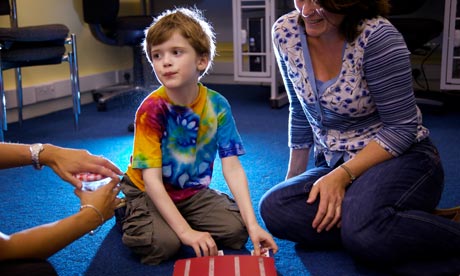
Traditionally, libraries mean words, but in Leeds they have also started to mean pictures - small, brightly-coloured, some witty, all very clear, and attached with Velcro to special satchels used by families with autistic children.
Laughs and clicks on a computer alternate at Moor Allerton branch library as Kate Webber and her six-year-old son, Theo, use the Boardmaker software, a symbol-based communication system.
For a child lost in language, the pictures bring a new sort of speech. A Jammie Dodger signifies "Yes, please." Webber with a red circle round her face and a diagonal line across it like a road sign means "Mummy's not available just now." Bathroom pictures are used for "May I have a wash/bath/go to the loo?"
But this works out expensive - at more than £300 for the basics, plus the cost of printing and laminating the pictures. And like any prolonged interaction between a parent and a child with permanent difficulties, it can be lonely work. Hence, Webber's visit to Moor Allerton, which led to Leeds Library and Information Service winning this year's Libraries Change Lives award - because changing lives is exactly what the installation of Boardmaker has done.
Webber recalls: "I told them about the system and wondered if they could get it, so that other families could use it too, and maybe we could all benefit through sharing. Then I went home and more or less forgot about it - until, a month or so later, the phone rang."
On the line was Jason Tutin, learning co-ordinator for Leeds libraries. "We realised how useful this could be, how in keeping it was with a library's place in the community," Tutin says. "We're not experts on autism, but we talked to the NHS and the autism outreach team of Education Leeds (the local schools authority), and got the go-ahead."
Now the system buzzes away in 16 of Leeds's 53 libraries, and the £5,000 prize awarded today by the Chartered Institute of Library and Information Professionals (Cilip) has more than paid for the project, the success of which is now leading to expansion. The service hosts a monthly meeting at the central library for families and their supporters - with coffee, chat and lots of ideas for new Boardmaker pictures - and it is awash with ideas about potential new clients. "There are a lot of people with communication difficulties who could be helped," Tutin says.
Leeds is looking at groups of older people, perhaps recovering from strokes or facing the problems of early Alzheimer's disease. And arrivals from overseas may join in; a Polish boy, who is at a local primary school and does not yet speak English, is trying out the system.
"I never thought it would go so far," says Webber, who finds the system so enjoyable that she uses it with her husband and Theo's 10-year-old brother as a fun supplement to ordinary chat. "It's been just great that Leeds libraries listened, looked into the idea, got the point, and ran with it."
• Audio: Martin Wainwright talks to Leeds libraries team at SocietyGuardian.co.uk

